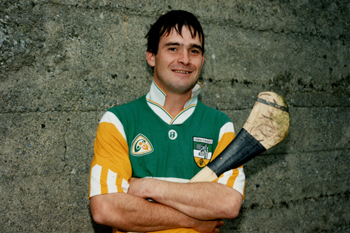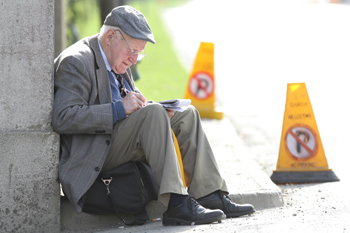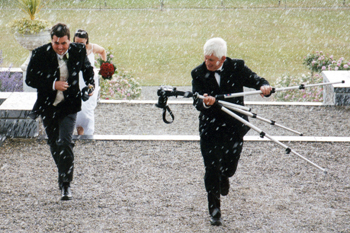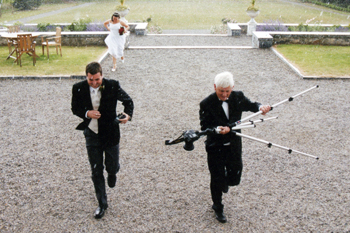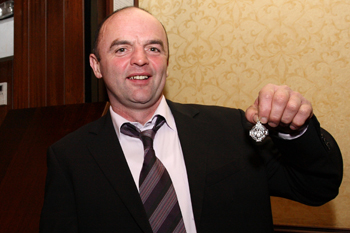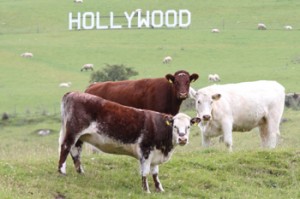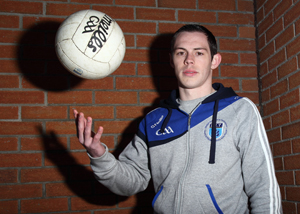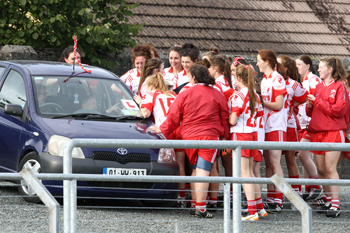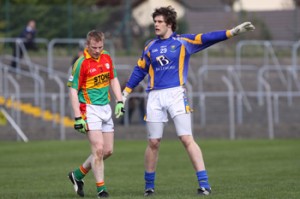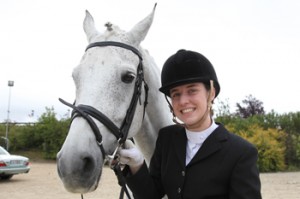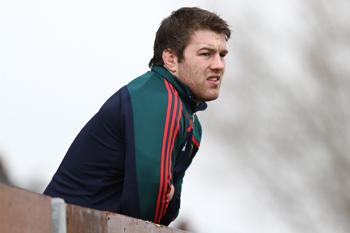Johnny Pilkington is a friend of mine from way back in my college days. I was also very privileged that he was my ticket source for the Offaly hurling glory years in the 1990s. It all started when I went to one of his Leinster Championship matches after we finished college to educate a Wicklowman about hurling. It was a rollercoaster for the next few years with the highs of All-Ireland wins, the madness of 1998 and also the lows like the 1995 final loss when he was captain. Johnny always reminded me that the tickets were for the camera and not for me!
He was elusive enough for photos in college but I got a few more as the years went by. This one from 1998 captures his mischievous grin. I’m surprised there hasn’t been a book on him to date with all the legendary stories, rumours and quotes over the years. Most of them of course have been wildly exaggerated and completely untrue but that’s what adds to a great character…
Irish Times article on Johnny Pilkington was published on September 11th 2008 before the 1998 All-Ireland Final.April 1998 – Guinness Press Release for Psyche-Up Ad Campaign: The hurling hero is psyching himself up . . . camera moves back to reveal another figure . . . new character brings with him a sense of foreboding, of dark forces . . . back to the hero, who takes a step further, swings his hurley across his torso and gazes down the corridor unflinching . . . the other figure mirrors these actions . . . close-up reveals he is the same person . . . the first hurler’s alter ego . . . the demon within . . . the demon cracks the base of his hurley off the floor . . . a fracture appears and travels down the length of the tunnel . . . it is white hot and molten, spitting and bubbling . . . with a fluid movement the demon takes up a scorching ball of molten material — a sliotar from hell! . . . with a sudden tremendous burst of speed the demon hurler knocks up the ball and fires it down with awesome power and pace to the hero facing him . . . our hero holds his ground . . . he tenses himself in anticipation and . . .
Johnny Pilkington leans back in his seat and runs his hand through his hair. Looks at the ceiling. Yawns. All the good things and all the bad things in Johnny’s life are stored up in his brown eyes. He is considering hurling just now. Good and bad.
“The whole idea of it actually is ridiculous,” he says. Johnny never saw a bush he wanted to beat around. “Training in muck and dirt. A big chunk of life gone fora little chunk of metal while an organisation is making millions. It’s a socalled amateur game with a professional way of preparing and nothing but a clap on the back or a knife in the back at the end. ‘Why bother?,’ I’d think to myself sometimes.”
And he grins, showing a wrecking yard of imperfect teeth. On the table is the round plastic ashtray, a mass grave for the cigarettes Johnny has sucked the life out of this morning. Johnny drums his fingers. No fags left. Forgot to buy a pack at lunchtime. The tension of a looming All-Ireland final can’t be found anywhere on his face. The fiancee says he’s a little snappy in the week before a big game, but he hasn’t noticed it himself. The way he’s been for the last year or so, well, it’s not molten lava or sliotars from hell stuff. Forgot the fags. Tut.
Take this summer and the game with Meath. A done deal after 10 minutes. Game over. Johnny found himself just standing in Croke Park in the middle of the field. Wondering and wandering. What’s the point in beating these by 25 points? Could have done with a fag.
Even when he has been with the programme it’s not been his best season. His detachment from the game and it’s molten passions has become more distinct. Sometimes he listens to the table banging speeches and the boys who are going to do or die and his ironic mind is leading him away from it.
“In the dressing room every game is the important game, you know. Win this one and ye’ll be alright lads. The All-Ireland, we’ll go out and play that and it’s the biggest thing ever. Two weeks later it’s the club championship. We have to win that and get into the semi. Then we have to win that to get into the county final. We’ve never put one back to back or something, so that’s the most important thing and so on.
“Sometimes in the dressing room I think, ‘wouldn’t it be more important if one of us lost his job. Then we’d be in trouble’.”
He bodyswerves. “Then again though, you wouldn’t be without the hurling.”
He wouldn’t be without it, but there are times when just being a hurling man in a hurling town closes in on him, days when the world seems a small place. If he didn’t have hurling, what would he be?
He works for Minch Norton, the agricultural supply people. Apart from farming, every customer has one thing to talk about. Hurling. All hurling. All the time. Goodfellas and blowhards and bad debtors. Hurling.
Listen, Johnny might say, you owe us money, you’ve owed it this long time. Johnny, there’ll be some hurling done to beat Kilkenny on Sunday, some hurling done.
Once, not long liberated from the ag block in UCD, Johnny and another ag graduate went out on a professional mission to see a farmer, a former Tipperary hurler actually. For half an hour Tipp asked Johnny’s colleague about farming. Then, business done, he turned to Johnny for the hurling chat at the end of it, as if Johnny was some sort of hurling bimbo included as part of a special offer. “You have to get away,” he says. “You need to escape it sometimes. There’s not much point in stopping hurling and staying around Birr. You’d have to go away altogether. Go somewhere where nobody knows you and nobody knows hurling . . . Kildare maybe.
He got away for a bit last winter and fled to the sanctuary of the local rugby club, where he hid out for the duration of the Towns cup campaign. The town buzzed with rumours that the rugby was eating Johnny Pilkington away like the ebola virus. Little to be talking about.
“My rugby career wasn’t exactly what it was made up to be,” he grins. “I was playing in the worst division in the worst league in the worst rugby country in Europe. Didn’t exactly have my head turned.”
Yet he appreciated it greatly. The lads on the rugby field with him two nights a week and on Saturday afternoons put the work in and pulled out less reward than hurlers are accustomed to. The GAA is the hub of life in Birr. The rugby boys go about their toil facing every problem except acclaim.
Babs gave him the call of course, summoning him back to the fold. Johnny told him he’d a couple of weeks left with the rugby lads and if Babs didn’t mind he’d like to see it out. Glad he did it. No idea what was down the line with Babs.
That’s life though. He shrugs in a way that’s part of him.
IT’S 20 minutes after the All-Ireland seim-final in Thurles has finally finished up. Offaly aren’t yet done with their whooping and hollering. The dressing room door opens. He stands in the dustmoted light, drained, drawn and a cigarette in his mouth. Lets his mouth crinkle into a smile. He-eeeere’s Johnny!
People sit Johnny Pilkington down for these sketches every year or so. They fiddle away while he sits there. Shade here, light there. And when they hand him back the portrait he’s king pogue, the Shane McGowan of his game, burping his way through the seasons, indifferent to hurling and stone mad for the drink.
He doesn’t recognise himself.
It started maybe in 1994, before the All-Ireland. Ger Canning asked him what an All-Ireland would mean to Offaly. Johnny said it would mean a lot of drink. Looking back now it was a stupid thing to say . . .
“But I was 24 and young and fresh out of college, no clue about tax or PRSI or those things. My reputation would be very exaggerated from then on.”
If there are then rumours out there, he reckons six of them are wrong and he hasn’t heard the other four yet. His fiancee’s family own a pub. Brian Whelehan owns a pub. His car is parked outside one or the other most nights. Quick tongues do their work about the place. Johnny Pilkington had six gallons of porter and went home in the bat mobile.
Johnny? He’s not a soak. He’s not telling you he’s at home listening to his Jane Fonda workout tapes either, but he’s not a soak. He has a life is all, and if he sits drinking minerals till his woman finishes work at two in the morning, he’s no need to reckon it with you in the morning.
“Look. Probably I drink a little more than I should, too much for inter county hurling maybe. Maybe 16, 17 pints a week, but there is a limit. I know the rumours, but where I’d be, the people who’d talk about me don’t be.”
He has the face and the character for it, the mixture of humour and sadness, the attitude and the walk. It all provokes gossip. In a town consumed by hurling he cradles his genius for the game with such nonchalance that he must infuriate the right-thinking fundamentalists.
“What damages me is being the lad with the one liner, the smart answer, I’m the messer. And sometimes I feel that, because of that, people don’t take me seriously. The people that matter know me.”
Some guy bellied up to him the night before a wedding once. Johnny’s fiancee’s sister was getting hitched and the do was held the Friday before an All-Ireland. The wedding was at two o’clock in the afternoon, and back in the hotel Johnny set into drinking minerals, tipping along nicely, enjoying himself despite the parade of people coming up to him all night with wagging fingers and soppy stern faces and drink taken.
“You’re not to be drinking too much tonight.” So this guy bellies up once and says his piece. Fine. Then up the second time. Bit more strident this time. Not long later he’s along for the third speech from the pulpit. “I can look after myself,” said Johnny. “Look, I’m standing here drinking minerals.”
But this guy is in Johnny Pilkington’s face, all froth and fervour pushing him around like he is a piece of public property. So what happened?
“I says, well fuck you anyway, I’m tired of you coming up telling me what to do. I went off and had a few quiet pints. Came back and had two more. I drunk five or six pints at the wedding from two o’clock in the day.”
And everyone of them counted threefold by the time they got spilled into the rumour machine the next day. He knows how the machine works, multiplying his consumption exponentially.
Take the year they won the Fitzgibbon cup in UCD. As it happened, the semi-final was on the same Saturday as another wedding which he had promised his fiancee he would attend. No matter what. Hell or high water.
Then a month later he realised it was Fitzgibbon cup weekend in Waterford. So he went and played the semi-final, hopped back into the car, drove home to Birr and was at the wedding before anyone was any the wiser. He had three pints, went to bed and drove to Waterford the next day. He played out of his skin and UCD won the Fitzgibbon.
Fast forward to a couple of months ago. Johnny meets a young fella still yomping through the groves of academe in Belfield. Said scholar pipes up to Johnny that in Belfield his legend still lives, preserved in alcohol as it were.
“How do you mean?”
“The Fitzgibbon,” says he and nods and winks.
“Eh?”
“The Fizgibbon. The lads were saying when you turned up for the final they had to pump coffee into you and put you under a cold shower, just to get you onto the pitch.”
“Never happened.”
That’s life when you have a big name in a small world. Part of you is hurling property. The bits of life you might call your own are sequestered. “I know what I’m doing,” says Johnny. “I’ll always go where I normally go. I’ll do the same thing and if somebody wants to say that Johnny was in the pub and he had 10 pints and he fell out the door and next day he raised the hurl, well it doesn’t bother me at all.”
Press him on the subject though and, rightly, he gets irritated. The business of players and their own lives blurs the borders in this amateur game. “It’s made out to be the wrong thing,” he says. “I enjoy a pint. I’ll have a couple the night before the All-Ireland. That’s me. I’m easy going, relaxed. Other fellas will miss a night’s sleep with the tension. No big deal.”
He’s baffled by the curiosity, but it’s been a baffling year. Why hasn’t he been dropped, for instance? “Seven games,” he laughs. “About seven different partners in midfield. It’s some kind of punishment.” Strange times. Not too long ago he came into training and there was a new fella sitting in the corner. Shiny top, red face, nothing to say. Johnny whispered an inquiry. “He’s the new physical trainer.”
“Hmmm.”
Next thing, the imposter was on his feet.
“I’m Michael Bond. I’m from Loughrea. I trained the 1983 Galway u-21 team. I love Offaly hurling. I don’t want to change Offaly hurling. I expect respect and I respect commitment. I give respect and I give commitment. Let’s go train.”
Johnny was loping out the door thinking to himself that the lack of bullshit was a commendable change when he heard the other. Jesus what was that?
Another turn in a convoluted season, that’s what. He’s hogged headlines without hurling well at all. “Did the Leinster championship exist at all?” he asks. “Must have been the dullest ever.”
It would have been if he and Babs hadn’t added the strange coda to it after the Leinster final. There were few words said in the dressing room that day they lost the Leinster final. Babs Keating said something or other. One of the players stood up and said there were too many lads acting the mick on the team. Nobody in Offaly was playing well and Johnny felt that they were hinting at me a couple of others. That stuck in his head.
He can’t really remember what Babs said. He’d tuned out, but in the car later he heard the sports news coming on, heard this business with Babs, washing his hands, telling the world that Offaly just weren’t listening to him. It got in under his skin, and next morning the phone rang. Liam Horan from The Irish Independent. Johnny cut loose.
“I thought afterwards that maybe there’s probably be holy war at training. We’d either knuckle down or, if he wasn’t happy, well me or him would have to go. Then just before it came on the news I heard he had resigned.”
Sorry it happened?
“Well, he was wrong to say what he did say. I was wrong to have a go back in the media. He was wrong in a lot of things he wrote about me after that too. I don’t know him as a man, but he doesn’t know me as a person.”
Seen Babs since?
“Babs isn’t from Birr. He doesn’t be where I be.”
Glad he’s gone?
“Am I glad he’s gone?” Pause.
“Well, to be honest, I don’t miss him.”
Johnny Pilkington grins again. Easy come, easy go. The words sound harder than he is. He’s not a fella for confrontation. Not a fella to hide from it either. Just not driven.
You pick away at him, talking about DJ Carey and Brian Lohan and those sessions they talk about, alone in the handball alleys battering a sliotar against the wall. Ever do that Johnny? He smiles at the mischief of it.
“Hmm. Did it once or twice maybe. When we were kids we’d be at home bating a ball off a wall alright. I’d never go off on my own though. Horses for courses really. DJ Carey and Brian Lohan, they’re the top hurlers in the country. I’m in the top 50 on a good day.”
When he’s warmed up and talking hurling his erudition on the topic is clear. This is his life after all, even if he tires of every dog and divil looking for a word.
“Sure I like to hang around. When I was working in Kilkenny, I knew a fella in Piltown, and if he went into a pub and he couldn’t see anyone there to talk to about farming or hurling he’d just leave. I could talk farming and GAA and sport and beyond that, well, what is beyond that? I don’t know. The salt of the earth, the hairy bacon and bit of cabbage kind of thing. That’s what I grew up with.”
He grew up with perhaps the most gifted bunch of hurlers playing the game today. Grew up with them and learned to take them for granted.
“We’re just a group of friends. Nothing special. We play hurling. We train. I remember in national school, I was 11 and Brian was 10. I got a phone call to come out and play an u-14 match in Banagher. I’m not too big now, but I was very small then and Brian was worse. The two of us got sent in as corner forwards. He’s been there on teams with me ever since.”
Joe Errity was in his class. Always exceptional, and Johnny reckons that, bar serious knee injuries, Joe might have become the best hurler in the country, or one of them.
“We grew up together. We went to places. Feile. The community games in Mosney. The crack in the chalet. All that.
“Daithi Regan was around, he was a year or two older, but we’d be on the same teams. Daithi would have been a mad hoor but he’s settled down now. I remember he was so big he’d solo up to me in training and handpass the ball over me and solo around the other side. Thanks Daithi, making me look good here.” They never fell out. Johnny can’t remember ever having a bad word. They’d have their arguments when they were out having a few pints, but nobody ever got wound up and walked out. There was always a third lad as referee. Anyway, it was more of a jeering thing, if you made an eejit of yourself at some stage it would be coming up forever. “If you couldn’t take it you wouldn’t really be in the group.”
That’s what keeps him ticking over really. No lava or flaming sliotars or burning passions. Just that feeling in the dressing room. The comfort of friends. “It’s 3.15 on Sunday and everything else is forgotten about. I like that. All that matters is the 20 lads togging out, plus the management. The lads who have put in the effort. You don’t want to let them down. Everything is forgotten about, all the troubles, all the worry. You have a job to do. It starts then and you tune off the other things. You’d be worried about missing the first ball, what’ll you do if you win it. “Everybody is focused in on the one thing. Some of the lads would go through a steel door. I’d be more inclined to open it first, but we’re all going the one way. You know the sounds. fellas chatting, balls banging, lads getting rubs, all the talk, fellas a bit nervous. It’s a nice place to be actually. Gets you away from everywhere, no trouble, no bitterness, no anything else. Just some lads out to do a job.”
Three-fifteen on a Sunday with the lads. That’s it, the heart of it, the Johnny Pilkington psyche-up.
“I know the rumours, but where I’d be the people who talk about me don’t be.”
“It’s 3.15 on Sunday and everything else is forgotten about. I like that.”
—
Dermot Crowe’s article on Johnny was published in the Irish Independent on June 17th 2001.
Johnny Pilkington took hurling seriously, but never too seriously. He was a rebellious figure and a successful promoter of the Offaly ethos.
AH, the memories. Johnny Pilkington is sifting through a medley of them two days after announcing his retirement from inter-county hurling. They emerge at random: landmark matches jostling with frivolous renditions of Rock the Boat in Whelahan’s. A career which began against Laois 12 years ago, crowned by a man-of-the-match performance, has ended in another mauling from Kilkenny.
Oscar Wilde would have told him the one thing worse than being talked about was not being talked about. He had no problems on that score and while Brian Whelahan was lauded for his wrist action, people were more interested in what Johnny did off the field. He took hurling seriously but never too seriously.
In that respect he was a rebellious figure and a successful promoter of the Offaly ethos. His irreverence provided a refreshing antidote to the stuffy pontifications of ‘hurling men’, and the grandiloquent bull that assails the game like no other. Offaly’s tribe was at odds with this. They chorused: what’s the big deal?
A thousand claps on Johnny’s back for that. Offaly became the country’s most venerated stress-free zone and he was their local Shaman waxing lyrical on how to relax and enjoy, yet still win a few All-Ireland medals along the way. He made you laugh and not feel bad about it.
So when you venture that maybe, with greater application, he might have achieved even more from his career the expression changes to a quizzical one, perhaps like George Best’s when the intruder asked how someone spoiled by lots of cash, booze and a crack blonde had got it all wrong.
Alas, we find Johnny Pilkington not being pampered by some friendly blonde in a posh hotel room but instead sitting at the bar of the Cherry Tree in Birr in the company of Joe Errity and former Birr chairman Sean Doorley. The popular image of Johnny Pilkington delves, of course, into the realm of caricature and partly misleads. At times the laid-back propaganda has conned opponents into false states of security.
Within that happy-go-lucky shell there is a serious core, as there had to be for him to survive so long at inter-county level. During the mid-’90s he formed an effective midfield partnership with Daithí Regan that helped topple Kilkenny. The team’s apotheosis was the dramatic 1995 Leinster final. He was All-Star material but had to settle for the sole award granted in 1990.
Since the 1998 All-Ireland win, and perhaps even a year before it, he believes his game had been on the wane. This was going to be the final year and it might have ended last summer but for the championship draw, as he explains.
“I was talking to (selector) Pat McLoughney after Michael Bond had been ratified as trainer and he says, ‘are you going to hurl next year?’ and I said, ‘the only way I’ll hurl is if we get Kilkenny in the first round.’ I felt if we were bet by Kilkenny then the hurling was finished. I said if we could beat Kilkenny we have a chance of an All-Ireland.”
For the first time ever in his career he approached last Sunday’s match confident Kilkenny would be beaten. In all previous encounters there was trepidation. “I felt that their backline was there for the taking,” he confides. “But you have to hand it to them; their backs were absolutely brilliant. When you get bet by that much, and three years in-a-row, what’s the point in going on?”
Not even the talismanic Michael Bond could work the magic this time. “He had this great confidence in Offaly,” acknowledges Pilkington. “And I think he brought it to training this year. He got an awful lot out of John Troy whereas a couple of trainers haven’t. He got an awful lot out of me, Joe Errity, Kevin Martin and Brian Whelahan.
“There was no difference in the margins (of defeat) over the last three or four occasions. And it’s a pity, too, looking at the team. I was just looking at the video there. You have Kinahan, Brian Whelahan, Kevin Martin, Johnny Dooley, Troy, Errity … to see a team like that getting bet by so much, it’s demoralising.”
How a manager like Eamonn Cregan coped with Pilkington’s idiosyncrasies is difficult to fathom and it was often a bumpy ride. Three times he was dropped for league games, once for failing to attend training two nights after winning the 1995 All-Ireland club title. He was Offaly captain at the time.
Cregan phoned the day after their win and insisted the Birr contingent be there. Pilkington relayed the news to an unenthused Birr party who made the travel arrangements for the next evening. When the day arrived Pilkington and Regan decided to go for a drink. “It ended up an all night kind of thing,” he explains.
The rest of the Birr players, waiting for the lift, noticed the absentees and “put two and two together and got four.” Soon they had joined them in the pub. All were dropped for the forthcoming league quarter-final against Cork. On another occasion Pilkington missed a league match against Kerry. “I tried his patience, there was no doubt about it. I think Eamonn was totally the opposite of myself. The way I prepared for a game was totally different to his but we worked on it.
“I remember talking to himself and Paudge Mulhare after we had a falling out as such in 1995 over a league match. They said, ‘listen, hurling is 24 hours a day.’ I can’t relate to 24 hours a day and I think a lot of the Offaly lads can’t relate to it either. There’s a couple … Brian Whelahan, maybe Johnny Dooley.
“So, I’d say it probably drove Eamonn mad. I remember one training session in ’93 where we trained in the ‘tech. Twelve of us trained and by the end there were only four left and that was four to six weeks before the Kilkenny game in the championship. So Eamonn would probably have found it very difficult to relate to us.
“I think in ’94 that things weren’t going well. But it just took one game to kick-start it, the Kilkenny game. Everything went exceptionally well for us that day. We’d a great start. And after that the whole thing just gelled. We went on from there.”
Despite their differences, Pilkington regards Cregan as the best manager that Offaly had during his career. His spell in charge also encompassed Pilkington’s greatest disappointment losing the 1995 All-Ireland final to Clare as captain. It is not something he has really talked about until now.
He had the victory speech half-composed. The punchline went: ‘Offaly may have won this All-Ireland but it’s been Clare’s summer.’ Maybe they peaked in the Leinster final but they let chances slip: one ball he gave to Troy was an exact replica of the final 12 months previously except the shot went a few inches outside the post this time. Maybe, he says, they weren’t ruthless enough.
It hurt more than many appreciated at the time, not least because the moment was completely submerged by Clare’s remarkable victory. And it still hurts. “Every time you see a lad lifting the McCarthy Cup your mind goes back to it. What would it be like? It’s not devastating but it’s just there at the same time and it’ll always be there.
“And I will see it time after time because it was Clare. If it was Kilkenny, Tipperary or Cork you wouldn’t see it as often. But you can ask the question: how often have you seen Anthony Daly lift the McCarthy Cup? Thousands of times.”
Managers have tried to give the Offaly lads a good old fashioned boot up the arse but this therapy has not had much success. Appeasement has always been the smart approach. In 1991 Padraig Horan, hewn from the breakthrough team of the ’80s, entered the ring with a regime in mind that contained little appeal for his audience.
He held a meeting at the start of the season and outlined his plans. Pilkington recalls: “He said, ‘right, no drink this year, no smoking,’ and two or three of the lads went up to him after the meeting and said, ‘listen, we’re not sacrificing our Saturday nights for anyone.”‘ By the time Horan was in charge of Birr in ’95 he had mellowed significantly.
On the eve of the All-Ireland finals of ’94, ’95, ’98 and last year’s, Pilkington treated himself to three or four pints because it helped him prepare. Before the sensational win over Cork he had a “small bottle of red wine.” To him it is no big deal and he doesn’t try to hide the routine. Sometimes, he admits, he missed training because of drink but “90 per cent” of the time he behaved himself impeccably.
Last year be pushed it to the limits, however, before the championship game against Wexford. He had a wedding on the preceding Friday, and the boozing carried over into the next day. He finally turned in, he reckons, at around two o’clock on the morning of the match. “I was alright but I knew that Adrian Fenlon could hurl me up a stick. We won easily and I was taken off with about 10 minutes to go.”
Did he not feel this was excessive behaviour? “Looking back I should have been more responsible,” he accepts. Two days before the 1994 All-Ireland he attended another wedding and was off alcohol but a guest kept reminding him to stay sober and he couldn’t stick him any longer. “I got tired of him and people like that telling me (what to do), so I had seven or eight pints. I think I played fairly well in ’94.”
League matches, of course, were much more relaxed affairs where you could have a few pints and no one would think anything much of it. The Offaly players were on first name terms with the bouncers in a nightclub near Newry where they stayed before matches against Antrim. They won the league only once, with Horan in ’91, but it wasn’t a prized possession.
The most bristly episode in his career came in 1998 with the fall-out over Babs Keating’s Leinster final comments on the team’s performance. “I would absolutely give him no credit at all for the 1998 All-Ireland,” states Pilkington firmly. Is he bitter? “No, and I am tired of the jibes, the jibes at Offaly. It seems to be a constant barrage whenever Offaly are playing.”
Pilkington’s retaliatory strike in the press led to Keating’s departure and the arrival of Bond. “I was disgusted because he put the full blame on the players. It was their fault, they did this, they did that. There’s no manager in the world that would do that, or should do that.”
The players he came up against included the sort of men you needed to be in the whole of your health facing: Pat Malone, Michael Phelan, Bill Hennessy, Ollie Baker, Mike Houlihan and Ciaran Carey. But Adrian Fenlon was his pick of the crop and he recounts their ’90s rivalry with obvious fondness.
“I think my greatest battles would have been with Adrian Fenlon. A fabulous hurler. Whenever he played well Wexford lost and whenever I played well Offaly lost. But he was the one I’d admire the most because he had the hurling and he produced a great ball into Wexford.”
The withdrawal of his brother Declan from the Offaly panel almost led to his own boycott in 1997 but he stayed put after talking to his brother about the affair. Declan Pilkington had been substituted and put back on the field against Wexford in 1995 which caused serious grievance with the player, while there was also a resistance by the county board to meet the cost of his farm relief expenses.
“Here we had a young farmer, married, two kids at the time, playing with Offaly. They wouldn’t pay the farm relief while he was off on a Sunday. It can be expensive but the county board made no effort to pay that. He was the lad that should have all this, the media, the things that I got because he lived for hurling. Still does,” Johnny recalls.
“And another thing that Eamonn Cregan did and it’s an awful thing to do to any man was that he started him, took him off and put him back on again. That shattered his confidence. He wasn’t the greatest scoring forward but he did the donkey work and you don’t get credit for the donkey work.”
IN tandem with Offaly there was Birr’s emergence which many people overlook while wagging the finger at Offaly’s disregard for the league. Several were involved in both camps when Birr won county titles in 1992, ’95, ’98 and 2000, stretching the season all-year round. The 1998 title win over Sarsfields is his most treasured memory.
“I’ve been very, very lucky. I had a very simple job to do in the ’90s, a workmanlike job,” he says with a hefty degree of modesty. “Pop up now and then for a score. I never hurled the shite out of anybody, I don’t think anybody outhurled me. They done well.
“But you come to a stage too where the lads … they’re beginning to think about work. You have those responsibilities, marriage, the kids … and they have their All-Ireland medals. And their legs go simple as that.”
He will be 31 next month, hardly ancient but too old for the running and grafting role which he feels he did best. Many of the social set have faded into marriages and family commitments, so that people like him had increasingly begun to feel like relics of the past. It was a good time to say goodbye.
So, will the real Johnny please stand up? “That’s where ye get it wrong,” he offers, alluding to the clownish image. “Ye have me down as happy-go-lucky. I would like to think that my performances in my best years were ones of determination and that I never gave up that’s where I excelled. I never gave up, I tried all the time, no matter how badly things were.”
Goodbye Johnny. It was fun.
More info:
Who fears to speak of ’98?
A radio documentary that relives a dramatic year in the life of Irish Hurling, where the summers’ games became our national soap opera.
Newstalk Off the Ball Podcast
Anthony Daly and Michael Duignan share memories of 1998’s Clare v Offaly controversy on Off The Ball
